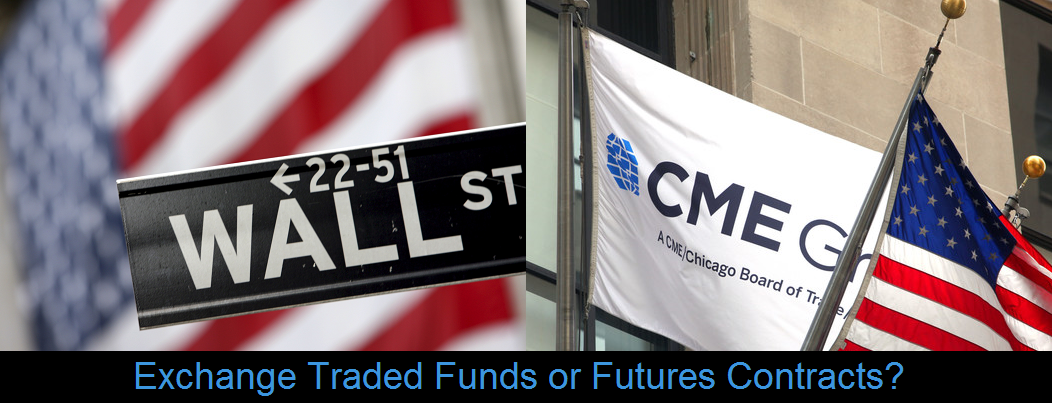
Exchange Traded Funds, or ETFs have seen a huge surge in popularity over the last decade, and this has led to the creation of countless new listings. As the universe of ETFs expands, funds designed to track virtually every traded commodity have come to market, and it’s now possible to participate in anything from Crude Oil to Kansas Wheat via shares in these products.

As many of these markets traditionally were only available via futures contracts (indeed it often by holding futures that the managers of ETFs track these markets), it seems reasonable to ask whether it is now better to use futures or ETFs to trade them. Futures attract a wide variety of participants – can ETFs cater to all these participants needs just as well?
The answer to the ETFs vs Futures dilemma, as with so many things in finance, is that it all depends on your circumstances and goals; ETFs and futures are, after all, very different products.
In the remainder of this article we’ve tried to list some suggestions about when one might be more appropriate than the other. These are, of course, very general guidelines intended to help you understand the product differences and make an informed choice.
ETFs Are Great If . . .
 You don’t want to introduce any leverage whatsoever into your trading, or you require just a small amount of leverage (x2 and x3 leverages ETFs are available for some popular markets and your broker may also permit you additional account leverage of up to 2:1). In a cash account, especially over a longer duration, this will be the most cost effective option (see below).
You don’t want to introduce any leverage whatsoever into your trading, or you require just a small amount of leverage (x2 and x3 leverages ETFs are available for some popular markets and your broker may also permit you additional account leverage of up to 2:1). In a cash account, especially over a longer duration, this will be the most cost effective option (see below).
You have a smaller amount of capital and wish to hold positions in many markets simultaneously. This is not possible with futures due to the margin requirements being too large for those with smaller account balances.
Your strategy depends on returns from dividends or stock-lending schemes to generate returns. As shares in an exchange traded fund are essentially the same as shares in any other company, an ETF will normally pay out dividends to shareholders. Additionally, your broker may pay you a fee to lend stock that you own to short sellers as part of a stock-lending scheme.
Consider Futures If . . .
You’ll be holding positions for relatively short periods of time or want to daytrade. Futures are subject to less strict regulation than ETFs, and you’ll be able to take advantage of a higher degree of leverage (about 20:1 with an account balance of around $5000 versus 2:1 for a stock trading account with a minimum account balance of $25000 for pattern daytraders).
You are managing a large amount of money. With anything above $100,000 it will begin to prove economical to trade futures rather than ETFs due to economies in commissions. The commission on a single futures contract will be around $3, and this will enable a position equivalent to around 500 shares in an ETF, which will generate commissions of at least $5.
ETFs vs Futures – A Cost Comparison
So which is the cheaper option, ETFs or futures? In a cash account with no use of margin then ETFs prove to be slightly cheaper. As leverage begins to be introduced, futures become the more economical choice. One of the reasons for this is that the leverage in futures is ‘built in’, so no interest is payable to the broker for the sum borrowed to finance a position.
Take a look at a detailed report from the Chicago Mercantile Exchange on this topic for more information: A-Cost-Comparison-of-Futures-vs-ETFs
How Interchangeable Are Futures and ETFs?

A final point to consider is that ETFs are typically composite funds and may aim to track a more general model of prices in a particular commodity.
This means that the price distributions of an ETF such as the United States Oil Fund (Ticker: USO), which does a great job of tracking oil prices using holdings across a range of crude oil futures, will not be identical to those of any one futures contract such as the Sweet Light Crude e-Mini contract (Ticker: CL). Most (though not all) ETFs are essentially indexes. These disparities should be kept in mind when testing strategies, and it is not safe to assume that because a strategy is effective in a specific future contract it will also be profitable in a more generalized ETF or vice versa.
| View similar articles about investing in futures: Futures Knowledge Base |
